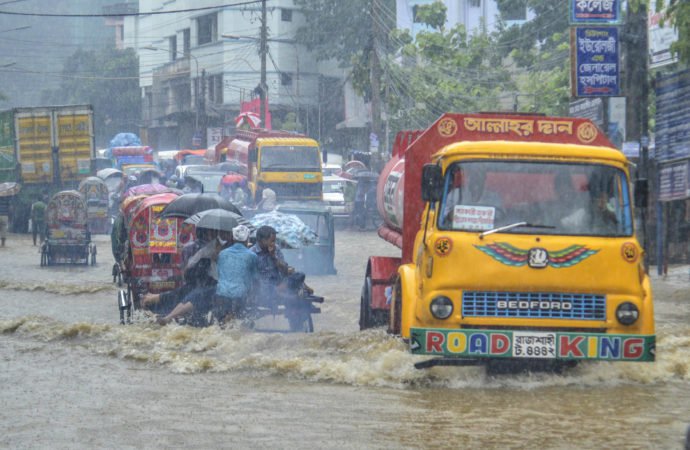The entrepreneurs in the export-oriented apparel sector fear a rise in the production costs due to the long-standing problem
Describing the perennial flooding as a “solvable problem,” CCC Mayor AJM Nasir Uddin said: “I am not sitting idly. I am trying my level best to address the problem.”
“Naturally, the absence from work has a direct negative impact on productivity as we have to meet a lot of shipment deadlines. Any hindrance to productivity triggers a rise in production costs,” added Ferdous.
The perennial water-logging problem has taken a heavy toll on the export-oriented businesses of Chittagong, known as the commercial capital of Bangladesh.
Nearly a third of the port city goes underwater every monsoon while its southern part gets inundated during high tides even with no rainfall.
Entrepreneurs in the export-oriented apparel sector fear a rise in production costs due to the long-standing problem.
According to Bangladesh Garment Manufacturers and Exporters Association (BGMEA), there are around 350 apparel factories in the premier port city.
These factories are mostly located in the Sagarika, Bayezid, Kalurghat and Pahartali industrial zones of the city.
This has become the standard mode of transport for many Chittagong residents Rabin Chowdhury/Dhaka Tribune
Md Ferdous, vice-president of the BGMEA, told the Dhaka Tribune that the water congestion was having an adverse effect on the RMG sector.
“It is a matter of grave concern that the apparel workers have to wade through knee-deep to waist-deep water to get to work. The persistent water-logging means the workers are always late,” said Ferdous, the managing director of an apparel factory in the city.
Mahfuzul Hoque Shah, director of Chittagong Chamber of Commerce and Industry (CCCI), also said the export-oriented activities of Chittagong were suffering immensely due to the long-running water-logging problem.
“The water congestion has turned out to be a major setback for the overall trade and commerce in the city,” he said.
“The exporters have to count huge losses every year as the rainwater halt trade activities. The authorities concerned should step in to address the problem without further delay,” the trade body leader demanded.
Ruhul Amin Sikder, secretary of Bangladesh Inland Container Depots Association (BICDA), said the decade-old water-logging problem had an adverse effect on the overall export and import activities.
According to the BICDA, a total of 16 private inland container depots or off-docks are located in the port city with a total capacity of 55,000 TEUs (twenty-foot equivalent units) of containers.
Six off-docks are located at Patenga area while the rest are located at Chittagong Port Access Road.
As many as 1,000 containers laden with import goods enter the 16 off-docks while a total of 2,000 containers carrying export goods leave the ICDs for shipment, said the sources at the BICDA.
“The water often enters the off-docks disrupting the overall operations. The battered road makes matters worse,” said Sikder.
“The exporters will be hard pushed to meet the shipment deadlines if the containers carrying export items cannot leave the off-docks on time.
“Each container usually carries goods worth Tk80 lakh to Tk1.20 crore. The damage is unimaginable if 100 of such containers miss the deadline in just one day,” the BICDA secretary said.
“In order to meet the shipment deadlines, we are badly in need of a dedicated route from Chittagong port to the off-docks where the vehicles carrying containers will not merge with the city traffic,” he demanded.
Ahsanul Haque Chowdhury, vice chairman of Bangladesh Shipping Agents Association, said they have had to count massive losses amounting to $10,000-$15,000 for every day that a vessel overstays at the outer anchorage of Chittagong port.
At least one in four roads of the port city has been battered by the latest torrential downpours.
According to Chittagong City Corporation (CCC), as many as 15 roads – totaling 57km in length – have been badly damaged, and that the extent of the loss could shoot up to Tk500 crore.
He added: “A good number of projects have already been undertaken to bring the perennial water-logging of city down to a tolerable limit.
“We spent Tk16 crore in the last financial year on maintenance of canals and drains of the city. We have already floated a tender of Tk18 crore for clearing waste and garbage from the canals,” the CCC mayor said.
He said: “The problem is lingering due to absence of sufficient water bodies in the city. Eventually canals and drains regularly get filled up with earth and sand obstructing the free flow of rainwater.
“Moreover, erratic weather patterns, rising sea levels, onrush of water from hills, poor drainage system and above all, unplanned urbanisation are to blame for the persistent problem,” the mayor argued.
Source: Dhaka Tribune

